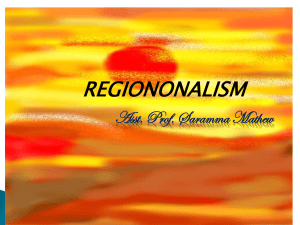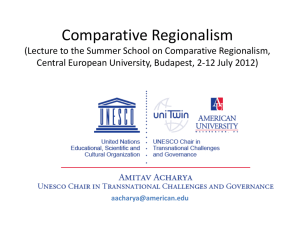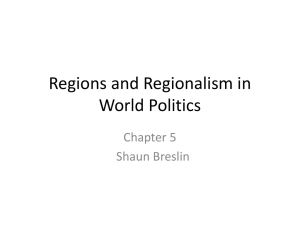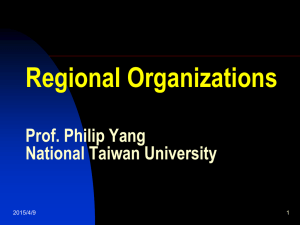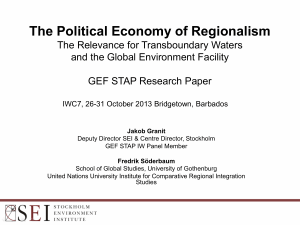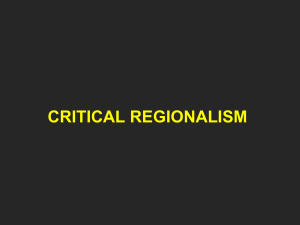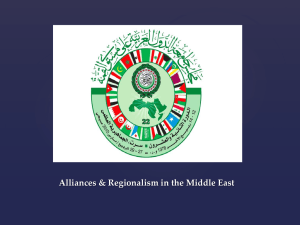GEOG220 Lecture13 - Regions and regionalism
advertisement
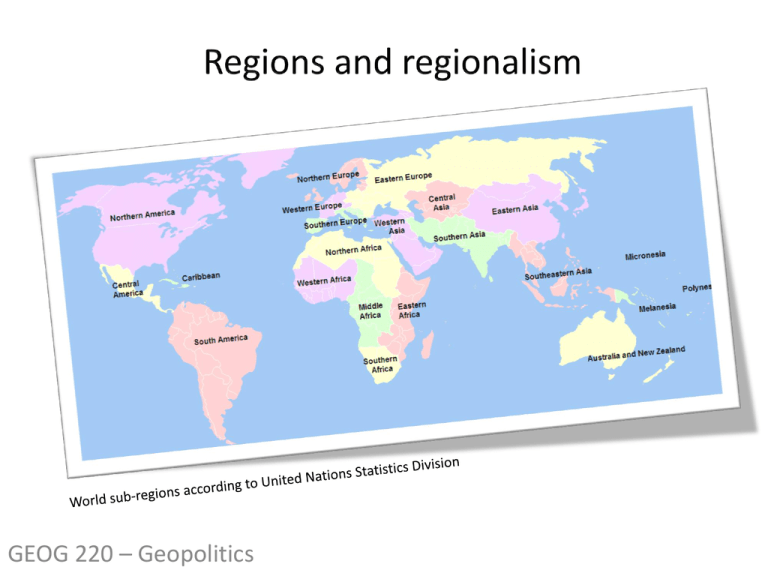
GEOG 220 – Geopolitics What is a region? • Regions are: – “An area, especially part of a country or the world having definable characteristics but not always fixed boundaries” (OED) – “An administrative district of a … country” (OED) • Regions are political and historical rather ‘natural’, though physical dimensions often count • Region as classification of space by government or official agencies • Region as spatial consciousness of individuals and communities • Region: “a medium and outcome of social practices and relations of power that are operative at multiple spatial and temporal scales, among which the region might serve as a kind of fix’ Dictionary of Human Geography What is regionalism? • Ideas and practices that conceive of politics, economics, and identity in regional rather than ‘national’ terms – Trade organizations – Defense – Governance Varieties of regionalism • Scale: – Sub-state or sub-national regions – Supra-state or transnational / international regions • Aims: – Political project: the recognition or creation of a political identity and governance => Regional autonomy e.g. Kurdish Regional Government in Iraq => ‘sovereignty pooling’ e.g. European Union – Economic project: economic integration List two regions in the neighbourhood … Regional political movement: Cascadia Regional Trade Agreement: North American Free Trade Agreement (NAFTA) Views on regionalism ‘Old regionalism’: seeking representation and secession ‘New regionalism’: economic integration and administrative functions Supra-state regions Why is regionalism growing? • Incentives and pressures on the state from above and from below – Above: neoliberalism, economic globalization, Trans National Corporations (TNCs), supra-state institutions – Below: sub-state nationalism Examining regions and regionalism • Regional geography: a scale of analysis drawing from human and physical geography => “regional geography” – Traditional disciplinary approach to dividing and classifying the world – Criticized as being mostly descriptive and essentializing (through its emphasis of regional ‘uniqueness’) • Geography of regionalism: analysis of regionalization processes • ‘The point of “doing” the region is • not ‘The point of ultimately to “doing” divide thethe world into regions and rest content.to It is region is not ultimately rather[..] to engage in classifying divide the world into regions and modelling geographical phenomena so as to generate and rest content. It is rather[..] questions about their variability and to engagewith in classifying and functioning respect to other phenomena’ modelling geographical • ‘region as a medium and outcome soand as relations to generate ofphenomena social practices of power that are operative questions about theirmultiple spatial and temporal scales, among variability andmight functioning which the region serve as a kind of respect fix’ with to other • Entry on REGION, pp 630-632 phenomena’ • Entry on REGION, pp 630-632 Geographies of regions/regionalism • Regional spaces: regional clustering of economic assets and activities => Driven by competition over Foreign Direct Investments, and adoption of model of Free Trade • Spaces of regionalism: (re)assertion of political and cultural distinctness => intermediary level for territorial government => Driven by relative dissatisfaction with existing state authorities => Combine to bring about ‘resurgent regionalization’ Concepts around regionalism • New medievalism: divided and overlapping authority – Domains of competence move beyond the state – Pluri-legalism: jurisdictional tensions • Transborder regionalism: – Formal and informal practices of transgressing state borders Why is regionalism difficult or limited? • Political institutions are state-based – Resistance by the state – Limited options for departure from state institutions • Regionalism not a panacea to problems of statecentered politics – Reproduction of political tensions between the governing and the governed – Decentralization can aggravate factors in the quality of institutions
